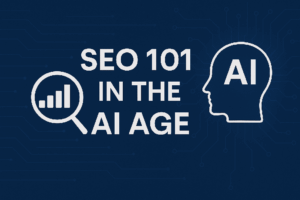The integration of Artificial Intelligence (AI) into Search Engine Optimization (SEO) is revolutionizing how businesses approach digital marketing. From automating keyword research to enhancing content creation, AI offers tools that make SEO more efficient and effective. Understanding how to leverage AI in your SEO strategy is crucial for staying competitive in today’s digital landscape.
Understanding AI’s Role in SEO
What is AI in SEO?
AI in SEO refers to the use of machine learning algorithms and tools to improve various aspects of search engine optimization. These tools can analyze large datasets, predict trends, and automate tasks that traditionally required manual effort.
Benefits of AI in SEO
-
Efficiency: Automates time-consuming tasks like keyword research and content analysis.
-
Accuracy: Provides data-driven insights for better decision-making.
-
Scalability: Allows for handling large volumes of data and content.
-
Personalization: Enhances user experience by delivering tailored content.
Key AI-Driven SEO Strategies
1. AI-Powered Keyword Research
AI tools can analyze search patterns and user behavior to identify high-performing keywords. This enables marketers to target the right audience with precision.
2. Content Creation and Optimization
AI can assist in generating content that is not only relevant but also optimized for search engines. Tools like natural language processing (NLP) ensure that the content aligns with user intent.
3. Predictive Analysis
By analyzing historical data, AI can predict future trends, allowing businesses to stay ahead of the curve and adjust their SEO strategies proactively.
4. Technical SEO Enhancements
AI can identify and fix technical issues on websites, such as broken links or slow loading times, which can negatively impact search rankings.
Implementing AI in Your SEO Strategy
Step 1: Choose the Right AI Tools
Select AI tools that align with your business goals. Some popular options include:HubSpot Blog
-
SEMrush: For comprehensive SEO analysis.
-
Ahrefs: For backlink analysis and keyword research.
-
MarketMuse: For content optimization.
-
BrightEdge: For performance tracking and insights.
Step 2: Integrate AI into Content Strategy
Use AI to identify content gaps, generate topic ideas, and optimize existing content for better performance.
Step 3: Monitor and Adjust
Regularly analyze the performance of your AI-driven SEO strategies and make necessary adjustments to improve results.
Key Takeaways
-
AI enhances SEO efficiency and effectiveness.
-
Implementing AI requires selecting the right tools and strategies.
-
Continuous monitoring and adjustment are essential for success.
Frequently Asked Questions (FAQ)
Q1: Can AI replace human SEO experts?
A: While AI can automate many SEO tasks, human expertise is still crucial for strategy development and nuanced decision-making.
Q2: Is AI in SEO suitable for small businesses?
A: Yes, many AI tools are scalable and can be tailored to fit the needs and budgets of small businesses.
Q3: How does AI impact content quality?
A: AI can enhance content quality by ensuring relevance, optimizing for keywords, and aligning with user intent.
Conclusion
Embracing AI in your SEO strategy can lead to significant improvements in efficiency, accuracy, and overall performance. By understanding and implementing AI-driven tools and techniques, businesses can stay ahead in the ever-evolving digital landscape.
For more insights on AI and SEO, consider exploring these resources:


